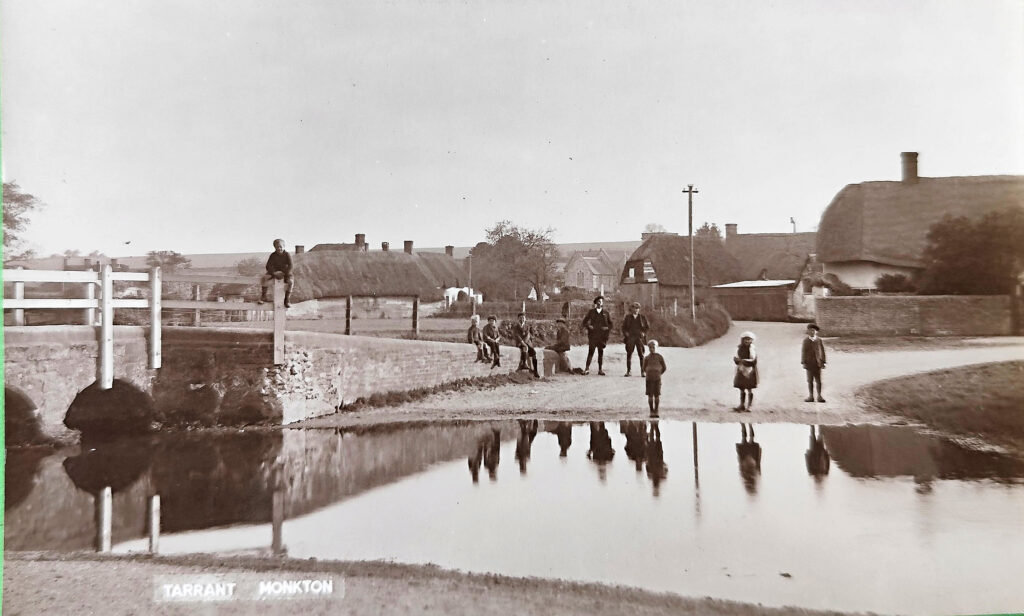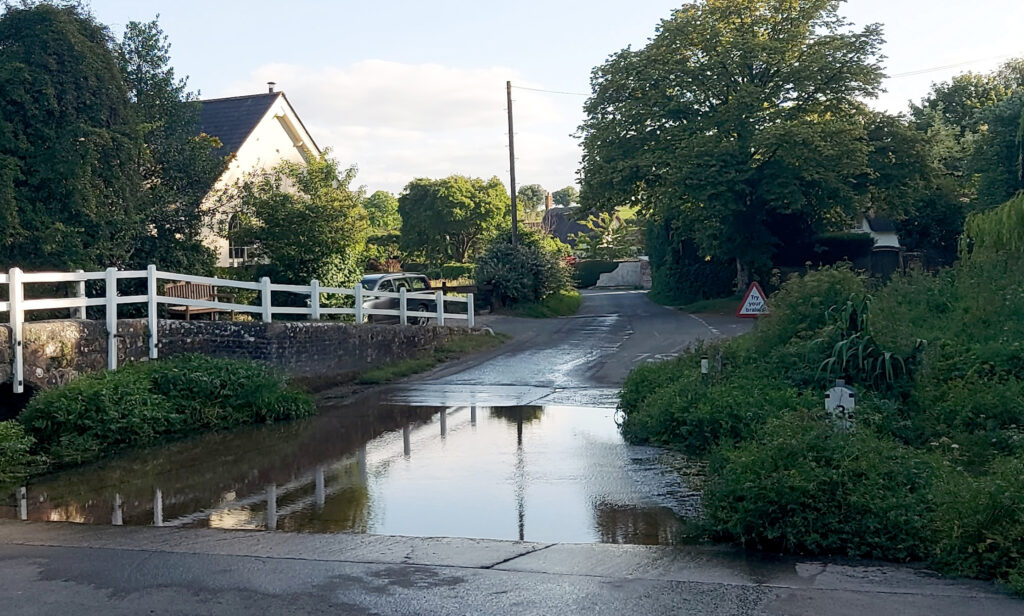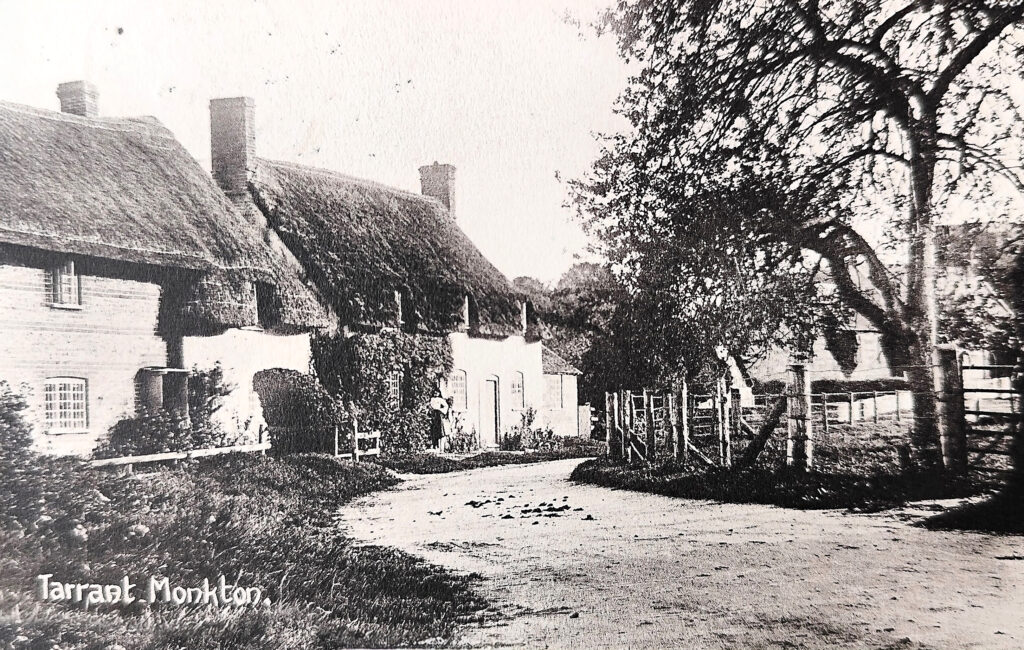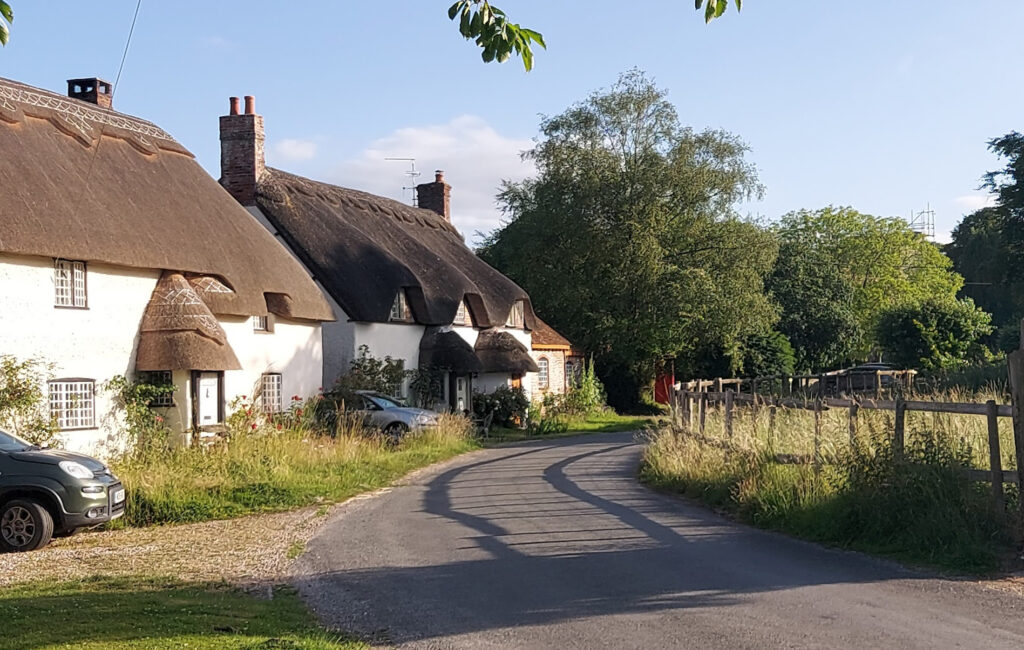We love pairing a vintage postcard with a photograph taken in the same spot today. Alongside the postcards, we feature a newspaper article from the same time and place – a little glimpse of life when the card was posted.

‘Now’ images by Courtenay Hitchcock

The building on the left was added in 1936.
DORSET COUNTY CHRONICLE, 1906
ASSAULTING A GAMEKEEPER (30th August). Thomas Clarke and William Clarke, young men, of Tarrant Monkton, were summoned for trespassing in search of conies on enclosed land in that parish. They were also charged with assaulting Thomas Newman, a gamekeeper, employed by Mr. Forder, of Langton, at the same time and place.
Mr. Baymond prosecuted. Newman stated that on July 26th he saw the defendants in Fox Brake. When they got near to him he challenged them. On attempting to search one of them William Clarke snatched witness’ stick away, and the other defendant struck witness in the face with his fist. He followed defendants out of the wood, and Thomas Clarke used threats towards him.
He had previously cautioned the defendants. Thomas Clarke denied the assault, and said the keeper received his black eye by falling on the ground backwards. (Laughter.) Defendants were sentenced to one month’s hard labour each for the assault, the charge of trespass being dismissed.
MR. FORDER’s SPORTING RIGHTS (Special Town Council Meeting, 6th December). Mr. Dyke alluded to the comtemplated visit of troops to the neighbourhood next year, and asked if it had been arranged for them to come. He had heard that objections had been raised to their coming, and if that was true he thought that they ought to make a strong representation to the member for the division and to the War Office, that they should be able to utilise the beautiful downs near Blandford which were most suitable for military manœuvres. It would be a shame for any man to stand in the way of the trade of the town by objecting to their coming. Mr. Payne said he did not think anyone would stand in the way purposely. The Mayor said he was glad to hear Mr. Payne say that, as he did not think anyone would stand in the way of the trade of the town being ndvanced. Mr. Payne said he was merely expressing an opinion. Mr. Riggs said unfortunately they did not seem to possess any information on the matter.
Mr. Payne said that negotiations were going on. Mr. Riggs thought if they were called upon to discuss the matter they should be in possession of all the information they could have. Alderman Smith asked if Mr. Forder, of Langton House, had asked £1,500 as compensation for the men coming on the Down. Mr. Payne believed that that was true. He had the information from Mr. Forder’s son, who told him that negotiations were going on, and his father had put before the War Office his request. He did not believe any answer had been given yet. Mr. Forder thought he should be compensated for any damage done to his sporting, and he wanted some understanding from the War Office that he would be compensated, and the sum of £1,500 had been mentioned.
He was not prepared to say what the conditions were: but as the War Office were so anxious to use the Downs he did not think the sum mentioned would stand in the way, as it was for a national and not private purpose, and the people of the town were anxious for the men to come there.
Mr. Dyke said that in after-dinner speeches, some gentlemen spoke of the advancement of the Empire and other patriotic things, and yet were the first to try to put obstacles in its way. He thought nothing would be lost by sending a representation to Mr. Wills and the War Office. Mr. Payne thought it would be advisable to send to Mr. Wills. Mr. Bunce thought that would do no harm, and would be a good move. Mr. Norman thought Mr. Forder wanted a lot for his few rabbits on the Downs, considering the estate did not belong to him.
Mr. Derham said they all knew on the Race Down and that leading to Tarrant Monkton there were few rabbits and little game. The British public, as a rule, did not trespass on private enclosures, and he thought with some precautions being taken Mr. Forder would find his rabbits and game were as safe there as if there were no troops on the Downs.
The Town Clerk said there was Launceston Heath to be considered. Mr. Woodhouse said there were no pheasants there. Mr. Derham said there were only a few hares there, and if they skedadelled away they would be back the next morning. He thought if those things were put before Mr. Forder and the War Office the amount required might be considerably reduced. Mr. Payne suggested a deputation should wait on Mr.
Forder. Mr. Woodhouse thought the deputation appointed to see Mr. Hillyer might approach Mr. Forder.
(Laughter.) Mr. Riggs said they had not finished with that business yet, as they had not got the money from Mr. Hillyer. Mr. Gould thought they must have a nice Government in power for Mr. Forder not to be able to trust it. In all the maneouvres he had known, officers had been appointed to assess the damages; but Mr. Forder did not seem to trust them. What was the matter with him? (Laughter.)
Mr. Payne: You are not sure of that. Mr. Gould: It looks as if he cannot trust the Government. Mr. Payne: You must not make allegations without knowing what you are talking about.
Resolution to write to the War Office and Mr. Wills, M.P., was carried.




